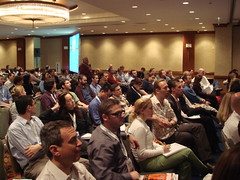A lot has changed in the search marketing conference industry in the past year. The biggest news being the addition of Kevin Ryan to oversee Search Engine Watch and Search Engine Strategies along with the departure of Danny Sullivan from SES to start his own venture, Third Door Media and the Search Marketing Expo or SMX series of conferences.
Additional news includes the success of new conferences like MediaPost’s Search Insider Summit, programmed by David Berkowitz as well as the reduction in conference dates for Brett Tabke’s WebmasterWorld’s Pubcon down to one (albeit, temporarily) in Las Vegas. With the number of new and niche conferences popping up it begs the question as to whether the market demand can support so many events?

Can SES, SIS, SMX, Pubcon and New SEM Conferences Coexist and Succeed?
- Yes (69%, 65 Votes)
- No (17%, 16 Votes)
- Maybe - see my explanation in the comments (14%, 13 Votes)
Total Voters: 94
Every time someone polls the audience at a SES conference, “How many people are new to the event?”, over 50% raise their hands. It’s a staunch reminder of how many people are in need of an education in the SEM business. Not only is there a need to ramp up on basic knowledge, but there’s a need for ongoing education as well. What other industry changes as often and as frequently as the search marketing business?
At the same time, as established marketing conferences such as the DMA and industry specific events add search marketing sessions to their programming, others such as ad:tech have actually cut back on the overall number of SEO and PPC related offereings.
I for one, am pretty optimistic about multiple conferences being able to succeed financially and in their ability to deliver value to the growing need for search marketing knowledge.
What is your opinion on this? Are there too many options out there? Are the established conferences meeting market demand or are they saturating the industry with too many broad and niche offerings?



